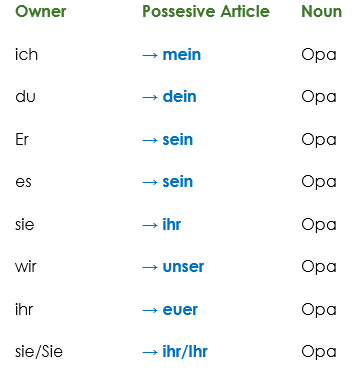What are Possessive Articles? (Possessivartikel)
Possessive articles indicate who owns what, and thus show ownership and affiliation.
They come before the noun. Sometimes they are also referred to as Possessive Adjectives, Possessive Determiners or Possessive Pronouns (which are similar but not the same as Possessive Articles, although many teachers teach it as the same!)
Example:
- „Das ist Anna. Ihre Katze spielt im Garten.“
The different forms:
The form of the Possessive Article depends on the Person it is referring to:
- „Mein Opa ist 80 Jahre alt. Sein Bruder ist 75 Jahre alt.“
- „Wie alt ist dein Opa?“
Only the reference person (the "owner") determines which Possessive Article we use, not the case, gender or number.

Declension of Possessive Articles
Possessive Articles have to be declined, just like all Articles.
- The Declension is based on the noun that comes after the Possessive Article (what is "owned" or what "belongs" to someone)
- Declension is the same for all Possessive Articles (meinem, deinem, seinem, ihrem, unserem,...) and is based on the gender, case and number of the noun that is "owned" (and that comes after the Possessive Article).

Exception:
- euer Vater ⇒ euren Vater
If you add an ending to „euer“, you must drop the „e“ in the middle.
Recommendation: Possessive Pronoun
Besides Possessives, there are also Possessive Pronouns. I will explain the difference in a separate lesson: Possessive Pronouns.
Analysis of an Example:

The person of reference is Anna. ⇒ Possessive: 3. Person Feminine ⇒ ihr
„Katze“ is the noun to whom the article belongs to.
⇒ Number: Singular (only one Cat)
⇒ Gender: Feminine (die Katze)
⇒ Cases: Nominative
⇒ Nominative + Singular + Feminine = ihre
More Examples:
A: „Das ist Jens. Sein Auto steht vor unserem Haus.“
B: „Ist Jens dein Freund?“
A: „Ja, Jens ist mein Freund. Er holt mich ab.“
B: „Na dann viel Spaß bei eurem Ausflug.“
A: „Danke, werden wir haben."
Gramato: Your German Grammar Coach
Try Gramato now!
Powered by EasyDeutsch AI

This is how Gramato can help you!
Gramato helps you with all your German grammar questions – fast, to the point, and always based on the trusted content from https://easy-deutsch.com.
Gramato offers fill-in-the-blank exercises on a variety of grammar topics, tailored to your level so you can practice exactly what you need.
Get answers in multiple languages – German, English, Spanish, French, and more. That way, you can understand grammar in the language you feel most comfortable with.
Clear and simple grammar explanations – so you can learn faster and smarter with Gramato.
Ask your questions or practice anytime with Gramato – no wait, just results!
Related Topics:
Entire lesson in German only: Possessivartikel
More lessons for the Articles:
- Was ist ein Artikel? (What is Articles?)
- Bestimmter Artikel (Definite Article)
- Unbestimmter Artikel (Indefinite Article)
- Nullartikel (Zero Article)
- Negativartikel „kein“ (Negative Article „kein“)
In addition to Possessives, there are also Possessivpronomen (Possessive Pronouns), and in addition to Possessives, the Genitive can also express affiliation.
In order for you to correctly decline the Articles, you must also be familiar with Genus (Gender) and the deutschen Fällen (German cases).
You can find an overview of all topics under German Grammar.
Recommendation: Free video lessons every Tuesday & Thursday
Sign up now: Email German Grammar course


